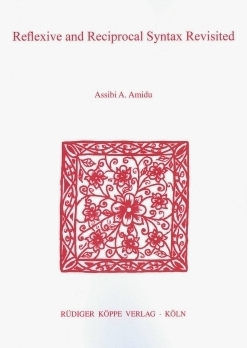
Reflexive and Reciprocal Syntax Revisited
Apologia for Internal Evidence in Kiswahili
Author: Assibi Apatewon Amidu. Series edited by: Bernd Heine, Wilhelm J.G. Möhlig †.
Series: EALD East African Languages and Dialects Volume 22
201116 pp. Roman, 188 pp.
numerous tables and charts
Text language(s): English
Format: 170 x 240 mm
450 g
Paperback
€ 39.80
Buy 'Reflexive and Reciprocal Syntax Revisited' as a downloadable PDF document directly from our online shop »
Order 'Reflexive and Reciprocal Syntax Revisited' as print edition »
In this volume, the author presents several semantic and syntactical conceptions of reciprocity and reflexivity in Kiswahili. Onto a brief introduction into his studies and the intended terminology, the second chapter is about the syntactical application of the reflexive nouns nafsi and roho, focusing the construction of noun phrases, particularly of object noun phrases. In chapter three, next follows an examination of the syntactical passivization of reflexive constituents. A classification of the reflexive marker {ji} into the Swahili-noun class system is being conducted and the typical semantic and syntactical attributes of this reflexive marker are being elucidated in chapter four. Furthermore, the author comments on the anaphoric qualities and syntactical causalities of reflexive noun phrases.
In the second part of this book, the author addresses the syntax and semantics of reciprocity. Therefore, in chapter five he examines culturally determined implications that can express “the interrelationship between language, experience and social roles” (Amidu 2011: 147) in terms of reciprocity used in transitive sentences. Thereto he analyses the patterns of the syntactical use of active and passive constituents. That reciprocal constructions are also possible in intransitive sentences in Swahili is demonstrated in chapter six.
Thus, logical concepts do not only form the basis of the reciprocal and reflexive syntax and semantics of Swahili in grammatical patterns but also in the speakers’ cultural-linguistic self-perception of the language. Through these recent findings of Swahili-research it becomes apparent that former theories such as the theory of reciprocity occurring only in transitive sentences can be considered obsolete. In addition, the author opens up new vistas and aspects for further analyses.
Under these links you will find publications by the author and further analyses of Swahili grammar and of related Bantu languages:
Accompanying material:
- Argument and Predicate Relations in Kiswahili
(ISBN 978-3-89645-042-5 ) - Classes in Kiswahili
(ISBN 978-3-89645-022-7 ) - Locative and Non-locative in Kiswahili Bantu
(ISBN 978-3-89645-713-4 ) - Matrix Nominal Phrases in Kiswahili Bantu
(ISBN 978-3-89645-550-5 ) - Objects and Complements in Kiswahili Clauses
(ISBN 978-3-89645-560-4 ) - Pronouns and Pronominalizations in Kiswahili Grammar
(ISBN 978-3-89645-543-7 ) - Reflexives and Reflexivization in Kiswahili Grammar
(ISBN 978-3-89645-028-9 ) - Semantic Assignment Rules in Bantu Classes
(ISBN 978-3-89645-703-5 )
Cross-reference:
- A Sketch of Swahili Morphology
(ISBN 978-3-927620-16-2 ) - Les extensions verbales en swahili standard
(ISBN 978-3-89645-907-7 ) - Swahili Phonology Reconsidered in a Diachronical Perspective
(ISBN 978-3-927620-38-4 ) - The Bantu Bibliography
(ISBN 978-3-89645-181-1 ) - Transitivity in African Languages
(ISBN 978-3-89645-726-4 ) - Transitivity in Swahili
(ISBN 978-3-927620-37-7 )
| « back | Print version | [top] |
 Books
Books Audio
Audio Biographies
Biographies Series
Series Festschrifts
Festschrifts Journals
Journals